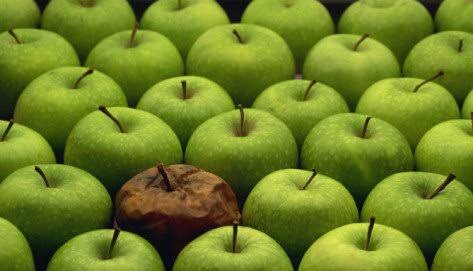Bad apple: Difference between revisions
Amwelladmin (talk | contribs) No edit summary |
Amwelladmin (talk | contribs) No edit summary |
||
| Line 9: | Line 9: | ||
Often, the people who look like heroes — NASDAQ chairmen, visionary innovators, star traders —''before'' the fact only start to look like bad apples ''after'' it. And vice versa. | Often, the people who look like heroes — NASDAQ chairmen, visionary innovators, star traders —''before'' the fact only start to look like bad apples ''after'' it. And vice versa. | ||
===Before and after fact: a play in two acts=== | ===Before and after fact: a play in two acts=== | ||
Quiz time: taking the information supplied about who everyone thought was hero | Quiz time: taking the information supplied about who everyone thought was the hero, or bad apple, ''before'' a celebrated financial markets catastrophe, fill in who you think it might have turned out to be ''after'' the event. | ||
{{Tabletopflex|100}} | {{Tabletopflex|100}} | ||
|+ The [[JC]]’s famous “[[guess the bad apple]]”{{tm}} game | |+ The [[JC]]’s famous “[[guess the bad apple]]”{{tm}} game | ||
| Line 30: | Line 30: | ||
|} | |} | ||
The [[JC]]’s view: the “bad apple” concept is not a good one if the virtue of one’s applehood is only apparent in hindsight. | The [[JC]]’s view: the “bad apple” concept is not a good one if the virtue of one’s applehood is ''only'' ''apparent in hindsight''. | ||
{{sa}} | {{sa}} | ||
*[[Human error]] | *[[Human error]] | ||
*{{fieldguide}} | *{{fieldguide}} | ||
*[[Rumours of our demise are greatly exaggerated]] | *[[Rumours of our demise are greatly exaggerated]] | ||
Revision as of 14:31, 18 January 2023
|
The JC’s amateur guide to systems theory™
|
Bad apple
/bæd ˈæpl/ (n.)
One of those mischievous human imps occupying unobserved crevices in the great steampunk machine who, by their human frailty, ruin the best-laid plans of the machines.
On the conventional wisdom, bad apples are the remaining fly in the ointment between us and the sunlit uplands of financial services utopia. Once the last one can be removed all will be well in perpetuity.
The JC wonders whether we should be quite so surprised. Bad apples gonna be bad. They will always find and exploit zero-day flaws in the system, which is what we should expect bad apples to do. These they will find them exactly where the system least expects them to be found, and is therefore not looking: apparently harmless, sleepy backwaters. LIBOR submissions. The accounting department. The Delta-one index swaps desk. In a family office.
But who the bad apples are depends on who is asking, and, critically, when.
Often, the people who look like heroes — NASDAQ chairmen, visionary innovators, star traders —before the fact only start to look like bad apples after it. And vice versa.
Before and after fact: a play in two acts
Quiz time: taking the information supplied about who everyone thought was the hero, or bad apple, before a celebrated financial markets catastrophe, fill in who you think it might have turned out to be after the event.
| Incident | Before | After | ||
|---|---|---|---|---|
| Hero | Bad Apple | Hero | Bad Apple | |
| Enron | Jeff Skilling Ken Lay Andrew Fastow |
Fortune Journalist Bethany MacLean Short-seller Jim Chanos |
_______ | _______ |
| Madoff | Bernie Madoff Fairfield Sentry The SEC |
Option Trader Harry Markopolos Barron’s Journalist Erin Arvedlund |
_______ | _______ |
| Barings | Nick Leeson Peter “not terribly difficult” Baring |
Er... | _______ | _______ |
| Archegos | Bill Huang Co-heads of PB, everywhere |
Junior credit officer | _______ | _______ |
| FTX | Sam Bankman-Fried Caroline Ellison |
Matt (So it’s a ponzi scheme?) Levine | _______ | _______ |
| WireCard | Markus Braun Jan Marsalek BaFin |
FT Journalist Dan McCrum Internal lawyer Pav Gill Short-seller Matthew Earl |
_______ | _______ |
The JC’s view: the “bad apple” concept is not a good one if the virtue of one’s applehood is only apparent in hindsight.
